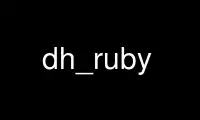
This is the command dh_ruby that can be run in the OnWorks free hosting provider using one of our multiple free online workstations such as Ubuntu Online, Fedora Online, Windows online emulator or MAC OS online emulator
PROGRAM:
NAME
dh_ruby - debhelper7 build system for Ruby software
SYNOPSIS
dh_ruby [OPTIONS]
DESCRIPTION
dh_ruby is a Debhelper 7 build system for Ruby software. It will automatically build and
install files contained in Ruby packages, trying to work as close to Rubygems as possible
but respecting Debian standards for Ruby packages.
dh_ruby can automatically run your tests against all supported Ruby versions, see the
"FILES" section below.
See dh_ruby --help for details.
SOURCE PACKAGE LAYOUT
dh_ruby supports two different source package styles: single-binary source packages, and
multi-binary source packages.
Single-binary layout
The default layout is the single-binary layout. This is the layout used by most Ruby
packages upstream, i.e. Ruby code in lib/, executable programs in bin/, etc. Packages
imported from Rubygems using gem2deb(1) will have this layout.
When using this layout, dh_ruby will install files (Ruby code, executables, gemspecs) to
the first binary package listed in debian/control.
Multi-binary layout
gem2deb version 0.4.0 introduced support for the multi-binary layout. This layout should
be used when you have a set of different Ruby packages maintained upstream in a single
VCS, and you decide that you also want to maintain a single source package in Debian
having the different components as separate binary packages.
In this layout, the source package contains the separate components in subdirectories
where each of them will use the standard Ruby layout (lib/, bin/, etc).
This layout does not support creating separate binary packages from the same root
directory. For those cases, see the documentation on DH_RUBY_USE_DH_AUTO_INSTALL_DESTDIR
below.
To indicate that you want to use a multi-binary layout, we have to 1) list your multiple
binary packages in debian/control as usual, and add an extra-field called X-DhRuby-Root to
each binary package stanza, indicating which directory has to be used as the root for that
binary package.
An example:
Source: mymultibinarypackage
[...]
Package: ruby-foo
X-DhRuby-Root: path/to/foo
[...]
Package: ruby-bar
X-DhRuby-Root: path/to/bar
The corresponding source package should be layed out like this:
foo/
foo.gemspec
lib/
foo.rb
bin/foo
bar/
bar.gemspec
lib/
bar.rb
bin/
bar
Important notes about multi-binary packages and the usage of X-DhRuby-Root:
· If your package uses the multi-binary layout, it must include `gem2deb (>= 0.4.0~)` in
Build-Depends.
Version 0.4.0 had a bug in the support for native extensions in multi-binary packages,
so if your package uses the multi-binary feature and at least one of the sub-
components has native extensions, you must use `gem2deb (>= 0.4.1~)` in Build-Depends
instead.
· The path indicated in X-DhRuby-Root, as you have probably guessed by now, must be
relative to the root of the source package.
· If any binary package declares a X-DhRuby-Root field, all other binary packages that
don't have one will be ignored by dh_ruby.
OPTIONS
--clean, --configure, --build, --test, --install
Commands called by debhelper at various steps of the build process.
--print-supported
Prints the supported Ruby versions.
-h, --help
Displays dh_ruby usage information.
-v, --version
Displays dh_ruby version information.
--gem-install
This option indicates that the build should use the gem command to install the files,
instead of the homegrown installer. Native packages will be installed to
/usr/lib/$ARCH/rubygems-integration/$RUBY_VERSION, while pure Ruby packages will be
installed to /usr/share/rubygems-integration/all.
--setuprb
This option indicates that the build should use setup.rb rather than the usual gem-
based build. To take effect, this option must come first !
ENVIRONMENT VARIABLES
DH_RUBY
Use this variable to pass command line parameters to dh_ruby. For example in
debian/rules:
export DH_RUBY = --gem-install
DH_RUBY_IGNORE_TESTS
This is a space-separated list of tests that dh_ruby will ignore during package build.
The available test names are the names of all supported Ruby versions (you can list
them with `dh_ruby --print-supported`).
If set to "all", all tests will be ignored during the package build.
DH_RUBY_USE_DH_AUTO_INSTALL_DESTDIR
If this variable is defined (to anything), dh_ruby will respect the directory informed
by dh_auto_install(1), usually debian/tmp. By default, gem2deb will install files to
debian/package, where package is the first binary package listed in debian/control.
This is useful for multi-binary source packages that don't conform to the supported
layout (i.e. separate subdirectories each with lib/, bin/ etc). Using this, all files
will be installed to debian/tmp, and you can them distribute them into separate binary
packages by using debian/$package.install files or explicit shell calls in
debian/rules.
Mixing DH_RUBY_USE_DH_AUTO_INSTALL_DESTDIR and multi-binary layout is not supported.
DH_RUBY_GEMSPEC
Determines which file contain the gem specification with package metadata. By
default, dh_ruby will read metadata from a .gemspec file in the root of source package
directory. You can use this variable to override that if you want to provide custom
metadata for the Debian package.
In the case there are more than one .gemspec in the source package root, you will need
to use DH_RUBY_GEMSPEC to instruct dh_ruby about which one to use.
Use dh_ruby online using onworks.net services